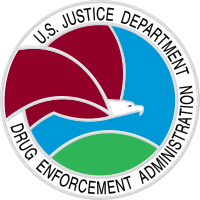U.S. Drug Enforcement Administration
| Drug Enforcement Administration | |
|---|---|
| Abbreviation | DEA |

Seal of the Drug Enforcement Administration
|
|

Badge of the Drug Enforcement Administration
|
|

Flag of the Drug Enforcement Administration
|
|
| Agency overview | |
| Formed | July 1, 1973 |
| Preceding agencies | |
| Employees | 10,784 (2009) |
| Annual budget | US$2 billion (FY2014) |
| Legal personality | Governmental: Government agency |
| Jurisdictional structure | |
| Federal agency | United States |
| General nature |
|
| Operational structure | |
| Headquarters | 600-700 Army-Navy Drive Arlington County, Virginia, U.S. |
| Special Agents | 4,890 |
| Agency executives |
|
| Parent agency | United States Department of Justice |
| Website | |
| www.dea.gov | |
The Drug Enforcement Administration (DEA) is a United States federal law enforcement agency under the U.S. Department of Justice, tasked with combating drug smuggling and use within the United States. The DEA is the lead agency for domestic enforcement of the Controlled Substances Act, sharing concurrent jurisdiction with the Federal Bureau of Investigation (FBI), Immigration and Customs Enforcement (ICE), Homeland Security, and the U.S. Border Patrol. It has sole responsibility for coordinating and pursuing U.S. drug investigations both domestic, and abroad.
The Drug Enforcement Administration was established on July 1, 1973, by Reorganization Plan No. 2 of 1973, signed by President Richard Nixon on July 28. It proposed the creation of a single federal agency to enforce the federal drug laws as well as consolidate and coordinate the government's drug control activities. Congress accepted the proposal, as they were concerned with the growing availability of drugs. As a result, the Bureau of Narcotics and Dangerous Drugs (BNDD), the Office of Drug Abuse Law Enforcement (ODALE); approximately 600 Special Agents of the Bureau of Customs, Customs Agency Service; and, other federal offices merged to create the DEA.
...
Wikipedia
